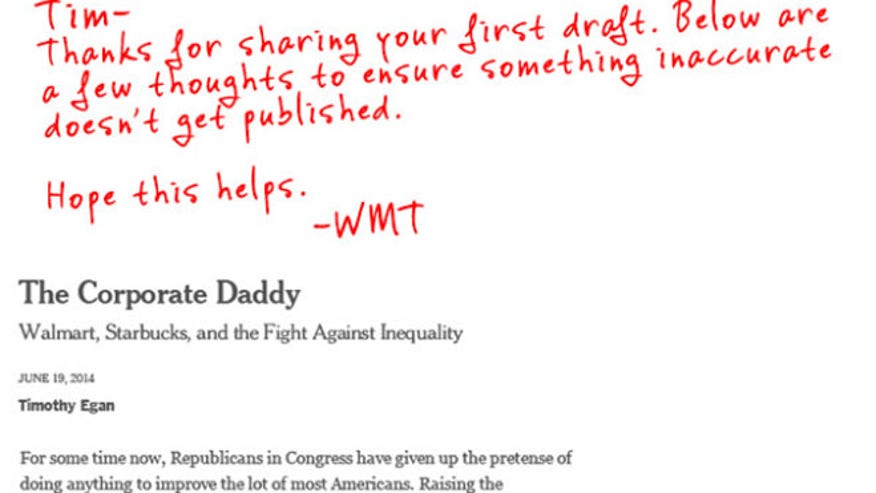6/24/2014
source
Walmart has unleashed a mocking online rebuttal to a New York Times column, providing red "copy editing" responses to columnist Timothy Egan's allegation the chain offered "humiliating" wages to employees and forced them into public assistance.
"(Walmart's) humiliating wages force thousands of employees to look to food stamps, Medicaid and other forms of welfare," Egan wrote. "Working at Walmart may not make you poor, but it certainly keeps you poor -- at the expense of the rest of us."
Because those employees must subsist on public assistance, Egan argued, Walmart is a net drain on the nation's economy. Citing a measure from House Democrats last year, he said the average Walmart store cost taxpayers $904,000 a year in various subsidies, or more than $5,000.
Not so fast, said David Tovar, the vice president of Walmart's corporate communications, who issued a mocking response late last week in the form of a red pen "edit" of the piece.
"Thanks for sharing your first draft," Tovar wrote. "Below are a few thoughts to ensure something inaccurate doesn't get published. Hope this helps."
In a blog posting, Tovar made numerous counter-arguments to Egan.
The "net drain on taxpayers" claim? Tovar said the company is the "largest taxpayer in America." Forcing employees into public assistance due to its wage structure? "We see more associates move off of public assistance as a result of their job at Walmart," Tovar wrote. What about the Democrats' study about Walmart's impact on Wisconsin? "Politifact.com concluded ... mostly false."
Tovar criticized Egan, saying the Times columnist is merely focusing on starting wages, rather than the company's overall economic efforts.
"Better idea for a piece: could focus on bringing back U.S. manufacturing (Walmart is buying $25 billion in U.S. products over 10 years) and expanding education, training and workforce development programs, i.e. things that will make a bigger difference, not just focusing on starting wages," he wrote.
Click here to read more from The New York Times and Walmart.com.
source

No comments:
Post a Comment